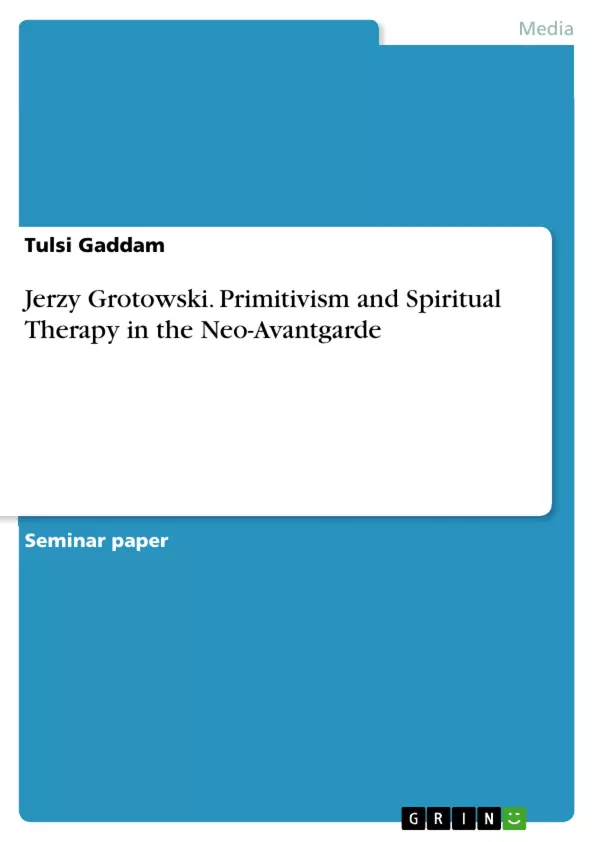In this essay, Grotowki’s interest in the Avantgarde concept of primitivism in relation to the spiritual healing of the community will be explored through three phases in his work. Poor Theatre, Paratheatre and Theatre of Sources. In addition, an exploration of the phases in Grotowski’s theories, the evolution of Grotowski’s performance theories will be analyzed in the context of communal healing of the spirit through ritual and use of primordial forms of theatre. This essay applies an Anthropological approach to Grotowski and his use of ritual as it concerns itself with the relationship between society, theatre and the ideas conceived by the two. This essay explores Grotowski's preoccupation with the Neo-Avantgarde notion of returning to the ‘roots of theatre’ explored through the phases of Poor Theatre, Paratheatre and Theatre of Sources in order advocate for the ‘spiritual healing’ of the community.
The Avantgarde is an artistic movement which followed Modernism, and can be considered an early phase of Post-Modernism. The Avantgarde can be split into two phases: The Historical Avantgarde, which began prior to World War II, and the Neo-Avant garde, which followed it. The Neo-Avantgarde can be classified as a period of experimentation between the 1950s and 1960s by practitioners such as Jerzy Grotowskiand Richard Schechner. Avant-garde Theatre, defines the ideology as a "philosophical grouping…linked by a specific attitude to western society, a particular aesthetic approach, and the aim of transforming the nature of theatrical performance" (Innes 4). The defining aspects of the Neo-Avantgarde are the interconnections in ideologies of the practitioners that dominated the movement and the rejection of western conventions and beliefs. This is explored through the actors physical presence, spectator-performer dynamics, the links between theatre and ritual, catharsis and the aspiration to reconnect theatre and life. The underlying concept connecting the aforementioned aspects is that of primitivism, which will be discussed in this essay in the context of Jerzy Grotowski.
Inhaltsverzeichnis (Table of Contents)
- Introduction
- Poor Theatre
- Paratheatre
- Theatre of Sources
- Conclusion
Zielsetzung und Themenschwerpunkte (Objectives and Key Themes)
This essay aims to explore Jerzy Grotowski's work within the context of the Neo-Avant garde and its emphasis on primitivism and spiritual therapy. It will analyze how Grotowski's concept of "returning to the roots" of theatre manifested in three distinct phases: Poor Theatre, Paratheatre, and Theatre of Sources. The essay will also examine how these phases contributed to Grotowski's larger goal of facilitating spiritual healing within the community through ritual and primordial forms of theatre.
- The Neo-Avant garde's focus on primitivism and its relationship to theatre.
- Grotowski's concept of spiritual therapy and its connection to ritual and primordial forms of theatre.
- The role of the actor in Grotowski's theatre and the importance of authenticity and vulnerability.
- The impact of the actor-spectator relationship on the process of spiritual healing.
- The use of ritual as a transformative mechanism in Grotowski's theatre.
Zusammenfassung der Kapitel (Chapter Summaries)
- Introduction: This chapter introduces the Neo-Avant garde movement and its key features, including primitivism, ritual, and the rejection of Western conventions. It then focuses on Jerzy Grotowski and his work, emphasizing his focus on spiritual therapy and the "return to man's roots."
- Poor Theatre: This chapter explores Grotowski's concept of Poor Theatre, defined by its extreme economy of resources and emphasis on the actor's presence and the actor-spectator relationship. It discusses the elimination of superfluous elements, such as scenery and lighting, and the importance of the actor's vulnerability and authenticity.
Schlüsselwörter (Keywords)
The essay focuses on key concepts such as the Neo-Avant garde, primitivism, spiritual therapy, ritual, theatre of poverty, actor-spectator relationship, and the phases of Poor Theatre, Paratheatre, and Theatre of Sources.
Frequently Asked Questions
Who was Jerzy Grotowski?
Grotowski was a Polish theatre director and theorist, a leading figure in the Neo-Avantgarde movement known for his revolutionary approaches to acting.
What is "Poor Theatre"?
Poor Theatre is a concept that strips away all non-essential elements like costumes and sets to focus entirely on the actor's physical presence and the actor-spectator relationship.
What are the three main phases of Grotowski's work discussed?
The essay explores the phases of Poor Theatre, Paratheatre, and the Theatre of Sources.
What is the significance of "Primitivism" in Grotowski's theories?
Primitivism refers to Grotowski's aim of returning to the primordial "roots" of theatre and human experience to achieve spiritual healing.
How does Grotowski view the role of the spectator?
He sought to redefine the relationship between performer and audience, often making the spectator a part of the ritualistic experience.
- Quote paper
- Tulsi Gaddam (Author), 2018, Jerzy Grotowski. Primitivism and Spiritual Therapy in the Neo-Avantgarde, Munich, GRIN Verlag, https://www.hausarbeiten.de/document/945409


